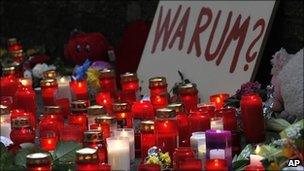Merkel vows 'intensive' probe of Love Parade deaths
- Published
Eyewitness Salil Bhate: "People had trample marks on their face"
German Chancellor Angela Merkel has demanded an "intensive" investigation into the deadly stampede at the Love Parade music festival in Duisburg.
Mrs Merkel said she had been "appalled" by the tragedy, adding that everything must be done to ensure such deaths did not happen again.
The crush outside a tunnel at the entrance of the festival killed 19 people and injured 340 on Saturday.
Survivors have blamed organisers for the deaths.
They said the site was too small and warnings of overcrowding had been ignored.
The organiser of the festival has said there will be no more Love Parades.
German prosecutors have launched a criminal investigation into the disaster.
'Terrible memories'
Speaking in the town of Bayreuth, Mrs Merkel again offered her condolences to the families of those killed and injured, saying the federal administration had offered full support to the North Rhine Westphalia regional government.
She said: "It now needs to be very intensively investigated as to how this happened because the many young people who were delighted to be going to the event have had... terrible memories and we have to do everything to make sure that something like this does not happen again."
The organiser of the festival, Rainer Schaller, said the Love Parade will never be held again
Mrs Merkel added: "The organisers have said themselves that they will not hold any more Love Parades but such large events need to be made safe and the federal states of course have the required police forces to do this."
Festival organiser Rainer Schaller appeared with officials at a news conference in Duisburg on Sunday.
He said: "The Love Parade has always been a joyful and peaceful party, but in future would always be overshadowed by yesterday's events.
"Out of respect for the victims, their families and friends, we are going to discontinue the event in the future, and that means the end of the Love Parade."
Duisburg Mayor Adolf Sauerland said that although the question of why the disaster had happened was "absolutely justified and must be answered", he insisted that until the investigation was complete, any apportioning of guilt would be "out of order".
"That would not serve the victims, nor would it serve the families," he said, adding that 16 of the dead had been identified.
A police spokesman later said at least six of the victims were foreigners - from Australia, Italy, the Netherlands, China, Bosnia and Spain. They ranged in age from 20 to 40.
Mr Sauerland said a security plan for the festival had been worked out beforehand "which gave no reason to believe that there would be a problem".

A poster among tributes at the Duisburg stampede site asks "Why?"
But BBC Berlin correspondent Tristana Moore says critics argued that the organisers and police were not prepared for such huge numbers of visitors and the site itself - an old railway yard - was too small and completely unsuitable.
German media said the festival had drawn about 1.4 million people.
However, the number has been contested. A local official in charge of the emergency response, Wolfgang Rabe, said the site "can hold 300,000 people and it was at no time full".
Spiegel magazine reported on Sunday that the festival only had authorisation for 250,000 revellers.
The head of a major police union, Rainer Wendt, told the Bild newspaper his organisation had warned a year ago that Duisburg was "too narrow, too small to manage the masses of people".
Police said that no-one had died inside the tunnel.
Deputy police chief Detlef von Schmeling said: "Fourteen people died on the metal steps leading away from the tunnel, two on a wall outside the tunnel."
Police had reportedly closed the exit to the tunnel and were telling those trying to get in to turn around when panic broke out, although the exact circumstances of the stampede are still not clear.
Eyewitnesses claimed they had tried to warn police before the stampede occurred that the tunnel was overcrowded, but said the authorities ignored their warnings.
One Duisburg resident, who lit a candle at a tribute site on Sunday, said: "This is such a shame for the city of Duisburg. Who gave a licence for this sort of planning? Heads should roll."
Leading his Angelus prayer at his summer residence outside Rome, Pope Benedict XVI, who is German, expressed "deep sorrow" over the deaths.
"I remember in my prayers the young people who lost their lives," he said.
- Published26 July 2010
- Published25 July 2010